an authentic Rajasthani experience
- Home > an authentic Rajasthani experience
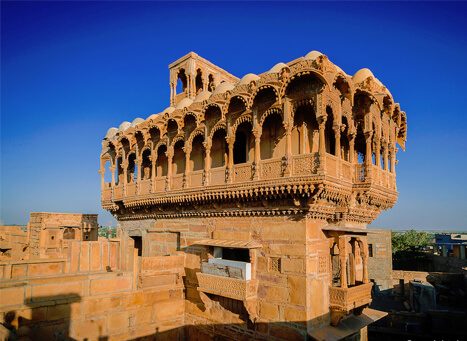
28 Sep
Salim Singh-ki-Haveli (Moti – Mahal)
The Salim Singh Ki Haveli has constructed about 300 years ago in 1815 and has been named after its owner, Salim Singh Mohta. This haveli was built out of the remains of an older haveli present here that belonged to the 17th century, near the Jaisalmer Fort. After a certain period of its construction, the Haveli was occupied by the Mehta family of Jaisalmer, which was said to be the most influential family of their time.
This haveli is mainly known for its unique architectural design, in which its roof has been constructed in the form of a peacock, complemented by an exquisite pavilion. Salim Singh added two additional floors of wood to the original haveli to make it more spacious, grand and taller. The gateways of this Haveli are guarded by Jaisalmer Tuskers, which are made out of sand and stone and provides an appearance very close to living ones.
Its structure has 38 balconies, all with their unique designs and walls covered with imperial paintings of the Mughal style. The front facet of the haveli resembles a ship stern due to which it is also referred to as Jahazmahal. Within the haveli, there is also a ‘Moti Mahal’. This place was the one where its owners used to enjoy royal dances. Architecturally notable residence built-in 1815 with a peacock-shaped roof & numerous balconies. Salim Singh ki Haveli is one of the most well-known places in Jaisalmer and has been on the top of lists for being an amazing destination. It is located at the heart of the Jaisalmer city, near the Jaisalmer railway station. The various stately homes and havelis of Jaisalmer is a reflection of the fact that the city is an integral part of the rich history of Rajasthan. One of the most ambitious constructions of its times, the Haveli is so magnificent, that it even invited the ruler’s envy during its era.
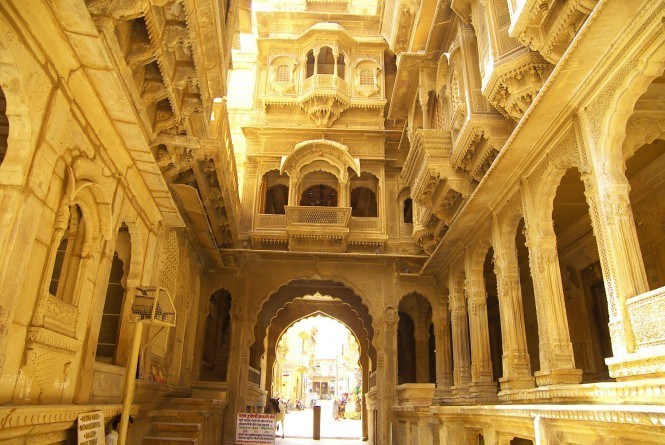
29 Jul
Patwon Ki Haveli
The Patwon Ji ki Haveli is an interesting piece of Architecture and is the most important among the Havelis in Jaisalmer. This is precise because of two things, first that it was the first haveli erected in Jaisalmer and second, that it is not a single haveli but a cluster of 5 small Havelis. The first among these havelis was commissioned and constructed in the year 1805 by Guman Chand Patwa and is the biggest and the most ostentatious. It is believed that Patwa was a rich man and was a renowned trader of his time. He could afford and thus ordered the construction of separate stories for each of his 5 sons. These were completed in a span of 50 years. All five houses were constructed in the first 60 years of the 19th century.
The Havelis are also known as the ‘mansion of brocade merchants’. This name has been given probably because the family dealt in threads of gold and silver used in embroidering dresses. However, there are theories, which claim that these traders made a considerable amount of money in Opium smuggling and Money-lending. This is the largest Haveli in Jaisalmer and stands in a narrow lane. This haveli is presently occupied by the government, which uses it for various purposes. The office of the Archeological Survey of India and State art and craft department is situated in the haveli itself.
Nevertheless, even after these encroachments and abuse, you can find a good amount of paintings and mirror-works on the wall. The other important aspects are its gateways and arches. You will notice individual depictions and theme on each and every arch. Although the whole building is made yellow sandstone, the main gateway of the Patwon Ji ki Haveli is in brown colour. One of the largest havelis in Rajasthan, Patwon ki Haveli is a cluster of five small havelis.
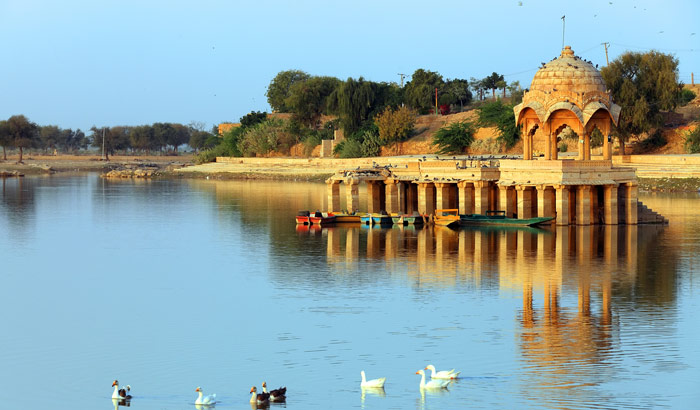
28 Jun
Gadsisar Lake
The Gadsisar Lake is one of the most famous tourist places in Jaisalmer which was built by Raja Rawal Jaisal, the first ruler of Jaisalmer. In the later years, Maharaja Garisisar Singh rebuilt and revamped the lake. This historic lake is located towards the south of Jaisalmer city and the entrance to the lake is through Tilon-Ki-Pol, a magnificent and artistically carved yellow sandstone archway. The Tilon Ki Pol is adorned with an idol of the Hindu deity Vishnu, installed in the year 1908.
The bank of the Gadsisar lake is surrounded by artistically carved Chattris, Temples, Shrines, and Ghats. Its charm lies in the fact that it was the only source of water for the Jaisalmer city in the olden days. Due to its proximity to Bharatpur, different migratory birds can also be seen on the bank of the lake, adding to its beauty. This is the most popular point to take photographs of Jaisalmer fort early in the morning when the fort looks golden with the first rays of the Sun and also a bird viewing site and a major attraction of Jaisalmer city.

29 May
What Tripadvisor says about Jaisalmer?
The dramatic and romantic desert fortress of Jaisalmer is an exotic city in Rajasthan’s great the Thar Desert. “The Golden City” rose to prominence as a result of its position on camel trade routes. It’s now most famous for the 12th-century fort and ornate “Havelis,” fine merchant-built houses and pavilions in the city’s medieval lanes. The surrounding Desert National Park offers opportunities to observe blackbucks, desert foxes, and chinkaras amid the rolling dunes, rugged crags, and waterholes.
Top Attractions in Jaisalmer:
1- Jaisalmer Fort
2- Longewala War Memorial
3- Kothari’s Patwaon-Ki-Haveli
4- Tanot Mata Temple
5- Jaisalmer War Museum
6- Gadsisar Sagar Lake
7- Jain Temples
8- Desert National Park
9- Bada Bagh
10- Kuldhara Abandoned Village
Historic Havelis, a vast desert landscape and picture-perfect sand dunes make Jaisalmer one of the most charming destinations in India. Modern comfort melds seamlessly with medieval charm at The Gateway Hotel Rawalkot Jaisalmer. The hotel is the perfect vantage point to watch the Jaisalmer Fort change color from sunrise to sunset.

29 May
What Tripadvisor says about Jaisalmer?
The dramatic and romantic desert fortress of Jaisalmer is an exotic city in Rajasthan’s great the Thar Desert. “The Golden City” rose to prominence as a result of its position on camel trade routes. It’s now most famous for the 12th-century fort and ornate “Havelis,” fine merchant-built houses and pavilions in the city’s medieval lanes. The surrounding Desert National Park offers opportunities to observe blackbucks, desert foxes, and chinkaras amid the rolling dunes, rugged crags, and waterholes.
Top Attractions in Jaisalmer:
1- Jaisalmer Fort
2- Longewala War Memorial
3- Kothari’s Patwaon-Ki-Haveli
4- Tanot Mata Temple
5- Jaisalmer War Museum
6- Gadsisar Sagar Lake
7- Jain Temples
8- Desert National Park
9- Bada Bagh
10- Kuldhara Abandoned Village
Historic Havelis, a vast desert landscape and picture-perfect sand dunes make Jaisalmer one of the most charming destinations in India. Modern comfort melds seamlessly with medieval charm at The Gateway Hotel Rawalkot Jaisalmer. The hotel is the perfect vantage point to watch the Jaisalmer Fort change color from sunrise to sunset.
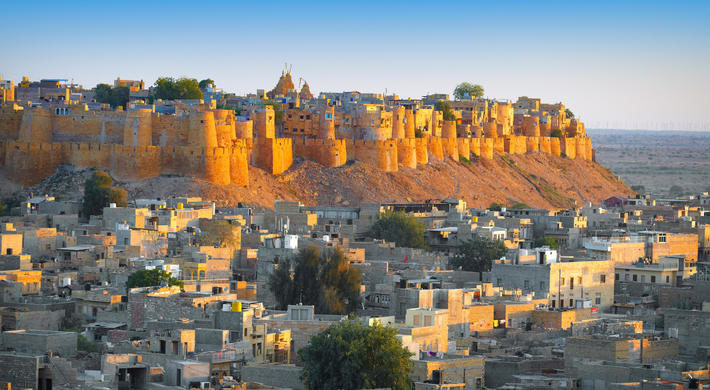
02 Mar
Jaisalmer Fort- The Sonar Quilla
Jaisalmer Fort is situated in the city of Jaisalmer, in the Indian state of Rajasthan. It is believed to be one of the very few (perhaps the only) “living forts” in the world, as nearly one-fourth of the old city’s population, still resides within the fort. For the better part of its 800-year history, the fort was the city of Jaisalmer. The first settlements outside the fort walls, to accommodate the growing population of Jaisalmer, are said to have come up in the 17th century. Jaisalmer Fort locally known as Sonar Quila is one of the largest forts in the world located in Jaisalmer City in Rajasthan, India. The base of the fort has a 15 ft (4.6 m) tall wall forming the fort’s outermost ring, within its triple ringed defence architecture. The fort’s upper bastions or towers form a defensive inner-wall perimeter that is about 2.5 mi (4.0 km) long. The fort now incorporates 99 bastions, of which 92 were built or substantially rebuilt between the period of 1633-47. The fort also has four fortified entrances or gates from the townside, one of which was once guarded by cannon. Other points of interest within the fort’s walls and grounds include Four massive gateways through which visitors to the fort must pass, situated along the main approach to the citadel. The Raj Mahal Palace, a form residence of the Maharawal of Jaisalmer. aisalmer fort being a occupied fort is on great risk due to over increasing population living inside the fort, inadequate civic amenities, derelict houses and many other things. Built over a weak sedimentary rock , seepage pose a great threat to the Jailsamer Fort.
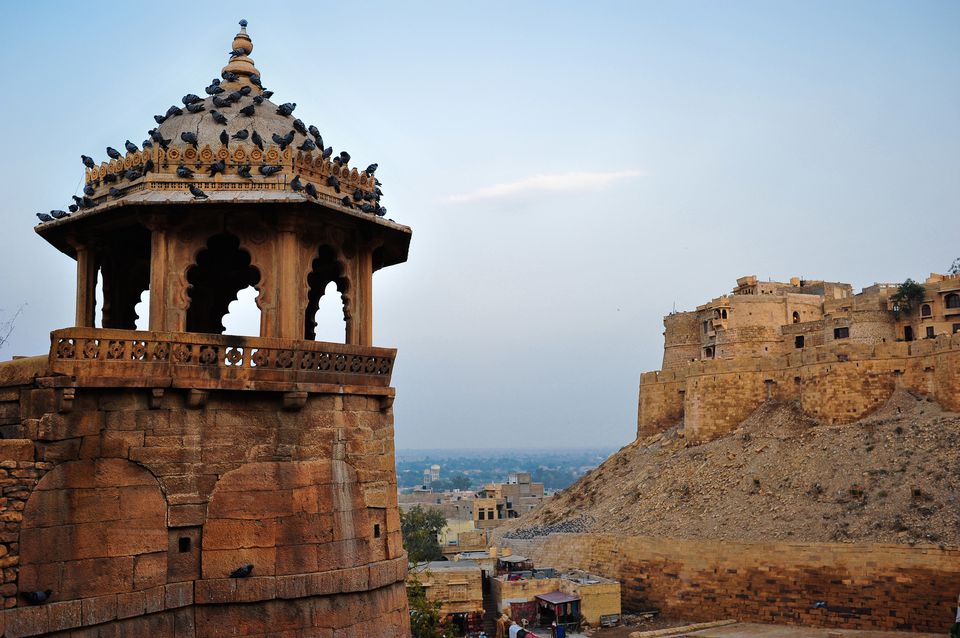
28 Dec
Jaisalmer- The Golden City
Jaisalmer is a princely state in the western Indian State of Rajasthan, in the heart of the Thar Desert known as the Golden City. It is distinguished by its yellow sandstone architecture. The “Queen of Thar” Jaisalmer is inarguably the best travel destination in Rajasthan. The town stands on a ridge of yellowish sandstone and is crowned by the ancient Jaisalmer Fort. This fort contains
a royal palace and several ornate Jain Temples. Many of the houses and temples of both the fort and of the town below are built of finely sculptured sandstone. It is the largest district of Rajasthan and 3rd largest district by territorial region in the country,
hugged on the west & south-west by the Pakistani Border. Tourism is a major industry in Jaisalmer. It is one of the most
peferred event- organising destinations in Rajasthan. Roadies, Balika Vadhu, Maharana Pratap, and several movies were also been shot in various location and hotels of Jaisalmer. The city’s most prominent landmark is the Jaisalmer Fort, also called Sonar Qila (Golden Fort). Unlike most other forts in India, Jaisalmer Fort is not just a tourist attraction. It houses shops, hotels and ancient havelis (homes) where generations continue to live. Some of the attractions in Jaisalmer that you must visit are
Jaisalmer Government Musuem, Nathmal Ji Ki Haveli, Salim Singh Ki Haweli, Patwon ki Haveli, Mandir Palace, Jian temples of Jaisalmer, Gadisar Lake, Bada Bagh, Desert National Park, Kuldhara Etc. Desert festival of Jaisalmer is the most awaited and famous cultural and colorful events that dominate the sand of Rajasthan and camel races, turban tying competitions are also organized. It is held in the month of February every year in Rajasthan. The desert festival in Jaisalmer has showcased Rajasthani folk songs and dance so it is a very attractive festival for foreign tourists. The rich culture of the region is on display during this three day long festival. This is the best time to visit Jaisalmer to witness performing arts like Kalbelia dances and folk songs and music.
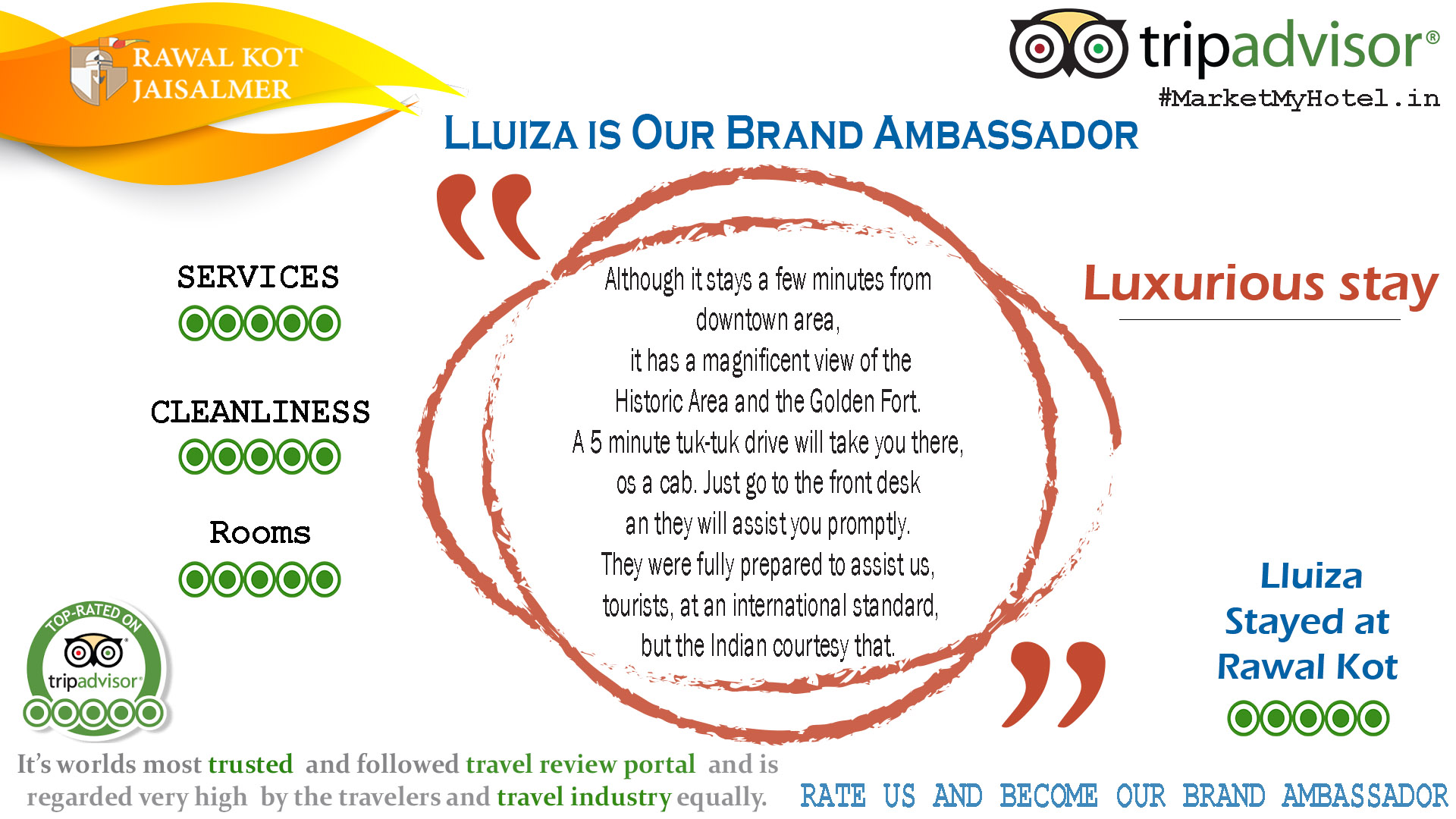
25 Sep
Precious Guests Review
Review by one of the Guests
Lluiza Says:
Beautiful and great services
Although it stays a few minutes from the downtown area, it Read More: https://zurl.co/WaL0
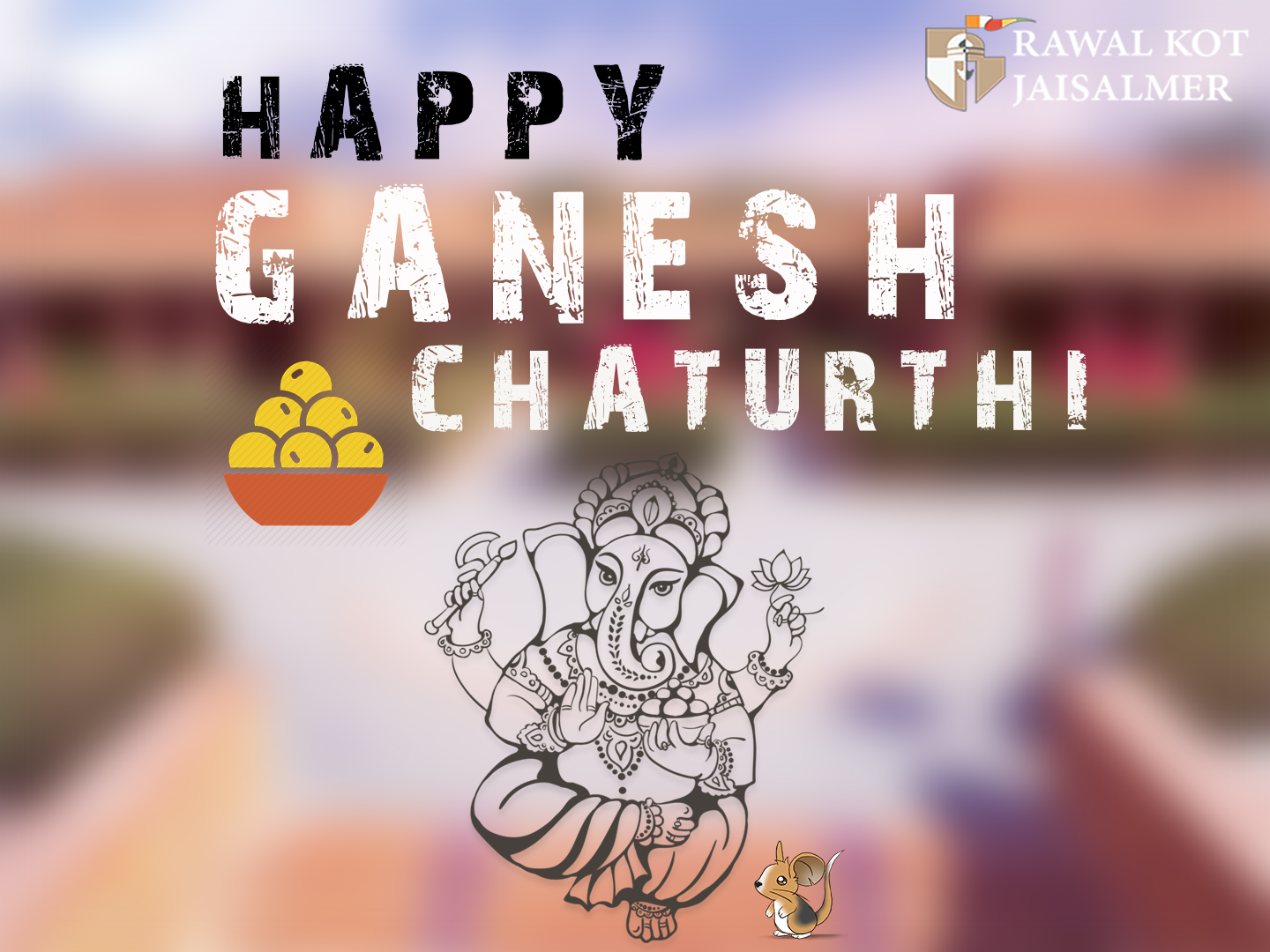
17 Sep
Ganesh Chaturthi Greetings!!
Ganesh Chaturthi, also known as Vinayaka Chaturthi (Vināyaka Chaturthī) or Vinayaka Chavithi is a Hindu Festival celebrating the birth of Ganesha. A ten-day festival, it starts on the fourth day of Hindu Lunisolar calendar month Bhadrapada, which typically falls in the months of August or September of the Gregorian calendar. The festival is marked with the installation of Ganesha clay idols privately in homes, or publicly on elaborate pandals. Observations include chanting of Vedic hymns and Hindu texts such as Ganpati Upanishad, prayers and vrata(fasting). Offerings and prasadam from the daily prayers, that is distributed from the pandal to the community, include sweets such as modaka believed to be a favorite of the elephant-headed deity.
Wishing You All Very Happy Ganesh Chaturthi!
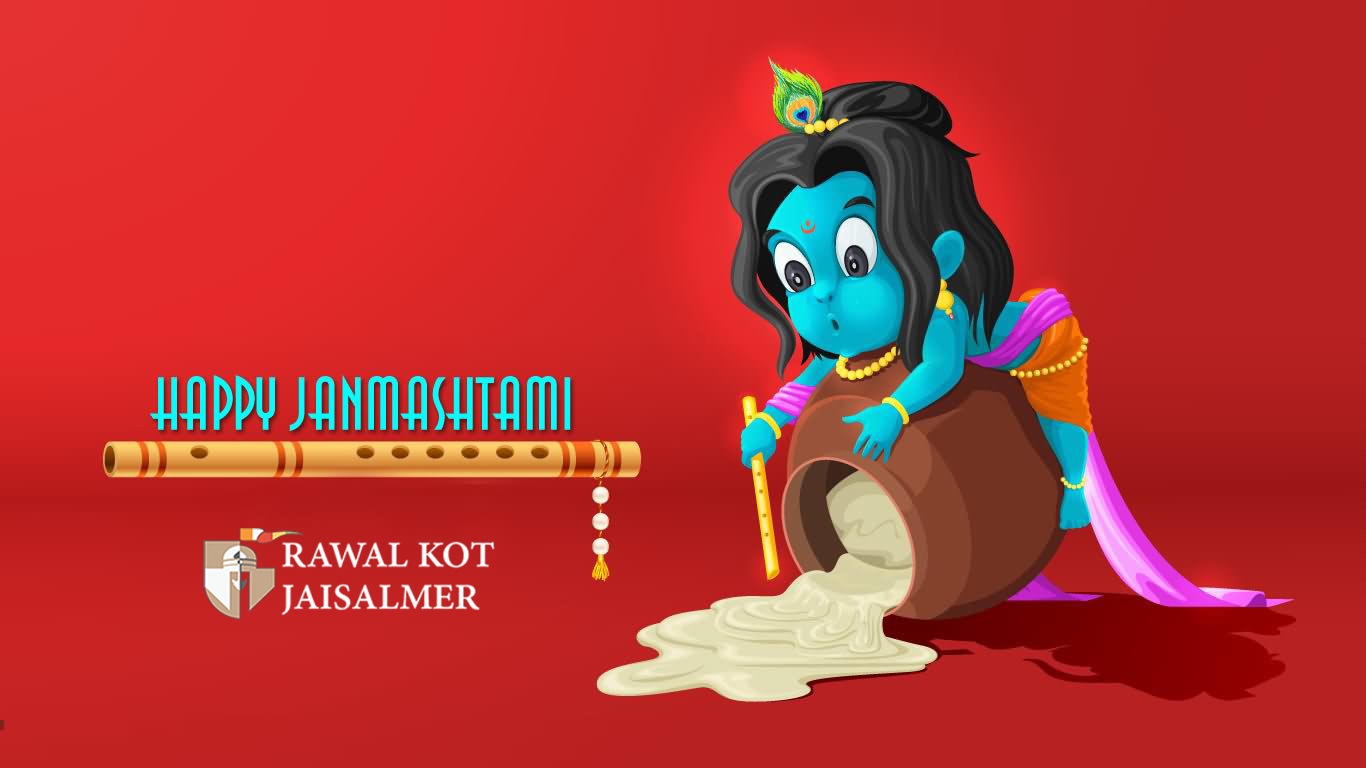
07 Sep
Janmashtami Greetings!!
Krishna Janmashtami, also known simply as Janmashtami or Gokulashtami, is an annual Hindu festival that celebrates the birth of Krishna, the eighth avatar of Vishnu. It is an important festival particularly to the Vaishnavism tradition of Hinduism. Dance-drama enactments of the life of Krishna according to the Bhagavata Purana (such as Ras Lila or Krishna Lila), devotional singing through the midnight when Krishna is believed to have been born, fasting (upavasa), a night vigil (jagarana), and a festival (mahotsava) on the following day are a part of the Janmashtami celebrations.
Jai Shri Krishna! Happy Janmashtami! Radhe Radhe!
- 1
- 2

